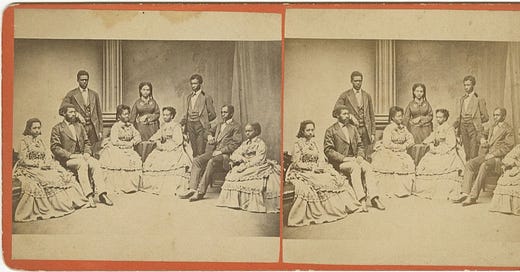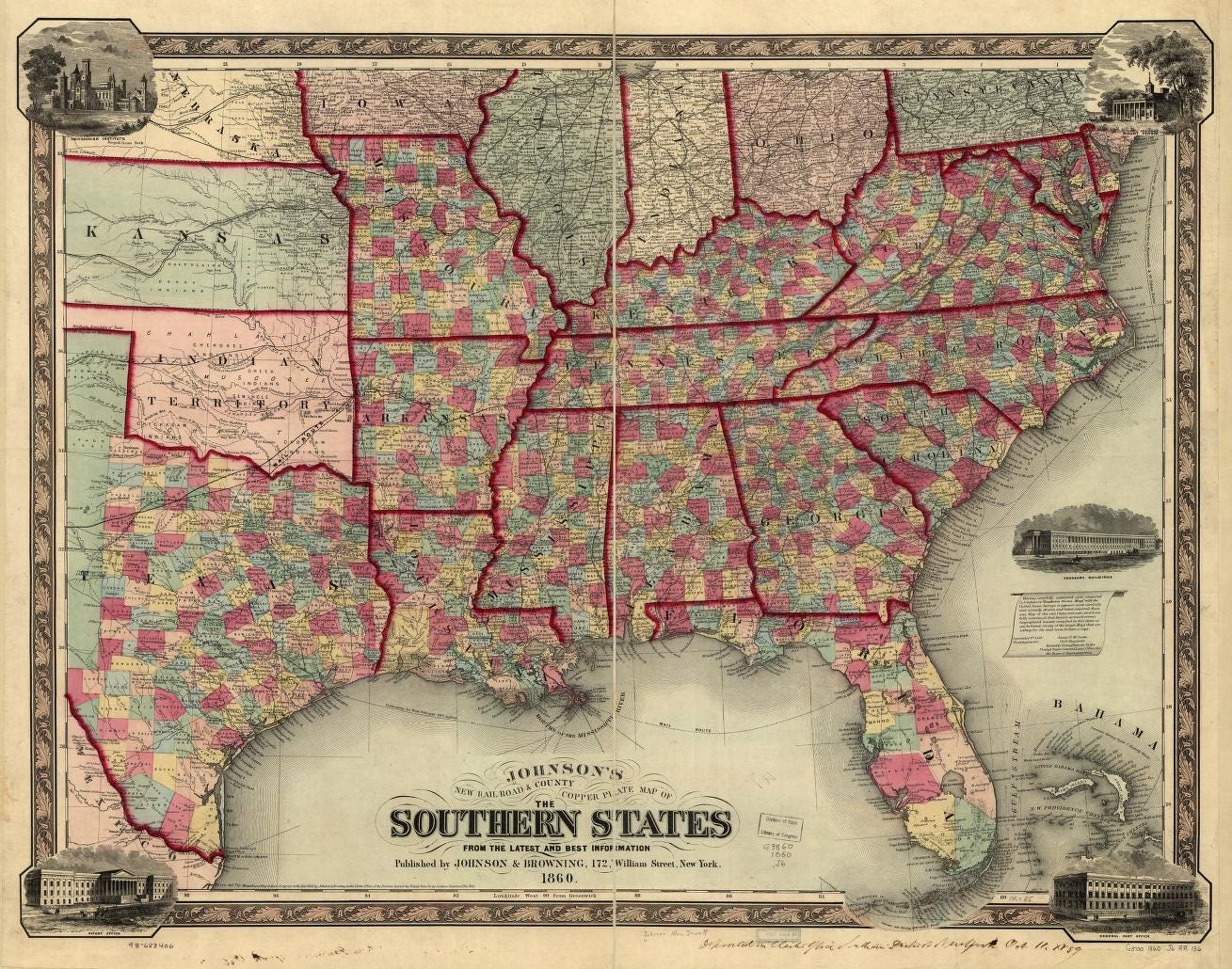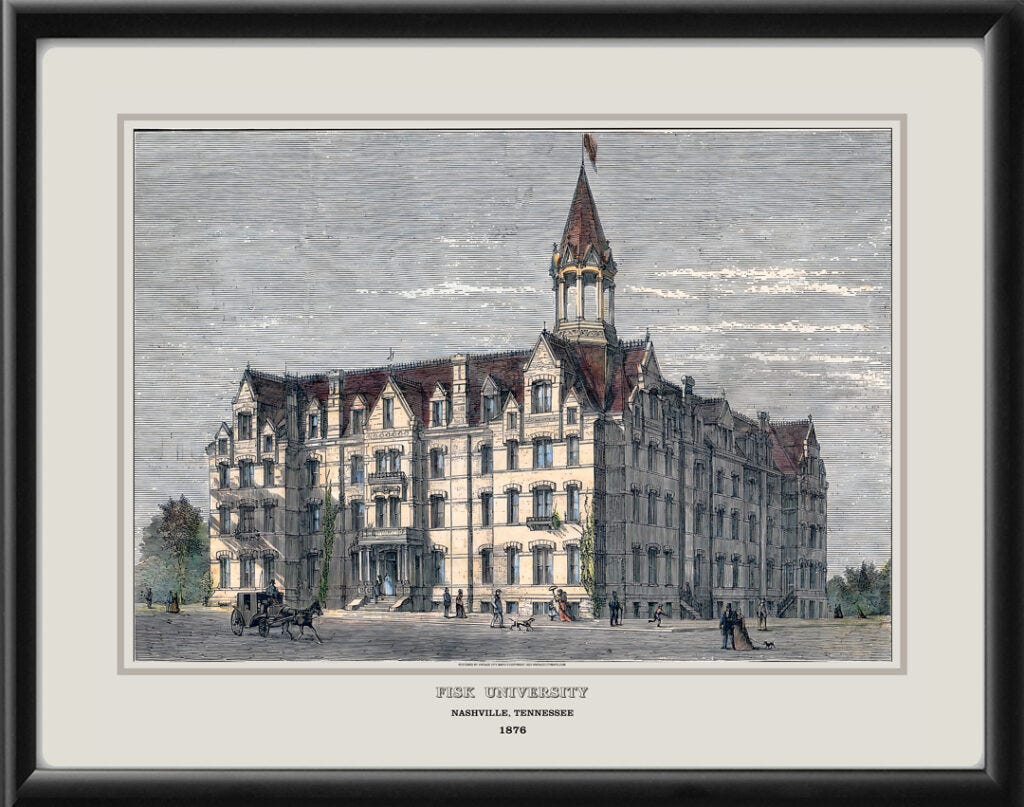Unfunded then Refound: The Fisk Jubilee Singers and Their Lasting Legacy On Nashville's Reconstruction History
Reconstruction's Unfortunate Downfall
“Swing low, sweet chariot
Coming for to carry me home”
As you read this post about the Reconstruction era in Nashville, I encourage you to listen to this riveting delivery of “Swing Low, Sweet Chariot,” sung by the Fisk Jubilee Singers in 1909. This spiritual captures the desire for enslaved people for emancipation, but White elites used the gospel as an outlet to depict that enslaved Black people did not live in oppression.
Music City! For musicophiles worldwide, Nashville, Tennessee, is known as the birthplace of country music and the epicenter of a plethora of genres, including blues, rock, and folk. Unbeknownst to most people, Queen Victoria crowned Nashville “Music City” in the 1870s after the Fisk Jubilee Singers of Fisk University in Nashville played for her on their first around-the-world tour.1 The positive legacy the Fisk Jubilee Singers left in the late nineteenth century often masks the horrid effects of Reconstruction that led to its formation.
To honor the legacy of the Fisk Jubilee Singers during Reconstruction in the United States, the National Museum of African American Music opened a new educational exhibition in 2024 dedicated to the legacy of the singers.2 Every year on October 6, Fisk University celebrates Jubilee Day to commemorate the singers' first tour and their contribution to the construction of one of the nation’s leading Historically Black Colleges.
To further understand the significance of the Fisk Jubilee Singers to Nashville’s narrative after the Civil War, we must first examine the convoluted history of Tennessee and the Confederacy.
Tennessee’s Dilemma
Tennessee’s geographic location—surrounded by nine other states—granted its Union army access to command approaches into Virginia, the Carolinas, and even the Deep South.3
On February 25, 1862, “following swift advances by Union troops across the Ohio River and through Kentucky, overwhelmed Confederate forces withdrew from Nashville, leaving the city in Union hands. [Nashville] quickly became the headquarters of Union forces in the South.”4
On February 22, 1865, Two months before the Civil War ended in 1865 and eight months before Congress ratified the Thirteenth Amendment, Tennessee abolished slavery. The state was the last of the Confederate states to secede from the Union in 1861 but was the first to leave the Confederacy.5
Abolishing slavery made Tennessee the “only Confederate state to rejoin the Union and escape the indignity of a prolonged period of Reconstruction” but only to a certain extent. Reconstruction encouraged “higher education, literacy, occupational status, and property ownership among the Black population”6 but ultimately fell short as Nashville’s Fisk University was cash-strapped in 1871 when Congress stopped funding Black colleges.7

Fisk's Promise of Reconstruction
Fisk University was founded in 1865 by John Ogden, the Reverend Erastus Milo Cravath, and the Reverend Edward P. Smith and was named after Clinton B. Fisk of the Tennessee Freedmen’s Bureau.8
The Freedmen’s Bureau established technical colleges and universities, including Fisk University, to train Black teachers, preachers, and doctors and increase literacy rates among the Black population.9 At that time, “hopes ran high that Reconstruction would bring a measure of restoration to America’s formerly enslaved people.” Initially, the “response was phenomenal: 900 students, virtually all of them recently enslaved, enrolled.” Reconstruction’s optimistic future was arm's length away. However, Fisk fell victim to Congress’s defunding of Black Colleges and Universities in 1871.
Letter addressed to Major General O.O. Howard regarding the withdrawal of government funding for Fisk University:
“Both Convention and Legislature will endeavor to please the General Government and pacify union people—freedmen especially. They say. "It's dead sure, the n——s are to vote" This vote is to be secured; but while promising knowledge, they will take advantage of ignorance, keeping up fair appearances, subsequently, I fear, to disappoint and betray. Controlling events and a constituency demanding justice will alone hold these leaders to what the times demand. Examined with much satisfaction, are the three well-known colored institutions of this city, namely, Fisk University, Central Tennessee College, and National Theological Institute. There are three hundred pupils in the former, and about one hundred each in the two latter, a portion of their young men preparing for University. All have substantial and commodious buildings, with convenient furniture, and teachers of ability… All the above schools are under the patronage of Northern societies, and now are increasing in numbers on account of the closing of so many public schools. In regard to other freedmen's education in the city and county, I can only repeat what has already been said. It is where all would be throughout the South if the influence of the General Government should be withdrawn—drooping, discouraged; teachers with blasted hopes, working hard, desperately, but pulling only against the current.”10
Desperate to keep the school afloat, “ George L. White hit on a plan: He would take Fisk’s fledgling choir—then just four men and five women—on tour to raise money.”11 And the plan worked! The newly established Fisk Jubilee Singers gained traction in international news and became a world-renowned musical group performing for notable figures including Ulysses S. Grant, Mark Twain, and Queen Victoria.
Unfortunately, a purportedly beneficial cause whose sole purpose was to raise money for the university turned into an opportunity for power for White extremists. Claiming that spirituals such as “Swing Low, Sweet Chariot” were purely religious gospel songs diminishes their significance in telling the story of suffering enslaved people.
In Summation
The Fisk Jubilee Singers’ origin story rooted in post-Civil War optimism and subsequent dismay reflects how laws, institutions, and practices adapted to White supremacy during the Reconstruction era. Even though Fisk University and other rising Black establishments encountered unwarranted levels of rebellion from White elites, the preservation and legacy of their relentless fight remain in sight today.
The Story of Nashville’s Music History. (2019, March 21). Visit Nashville TN. https://www.visitmusiccity.com/about/story-music-city
Fisk Jubilee Singer Exhibit. (n.d.). Retrieved January 12, 2025, from https://www.nmaam.org/Fisk-Jubilee-Singers#:~:text=The%20Fisk%20Jubilee%20Singers%20Museum,renowned%20Fisk%20Jubilee%20Singers%C2%AE.
Trust, A. B. (2016, September 14). Tennessee in the Civil War. YouTube.
Briggs, Gabriel A. The New Negro in the Old South. Rutgers University Press, 2015.
Trust, A. B. (2016, September 14). Tennessee in the Civil War. YouTube.
Frieden, J., Grossman, R., & Lowery, D. (2024, March 31). Political and socioeconomic effects of Reconstruction in the American South. CEPR. https://cepr.org/voxeu/columns/political-and-socioeconomic-effects-reconstruction-american-south#:~:text=Reconstruction%20led%20to%20higher%20education,to%20enforce%20the%20legal%20changes.
Newcott, B., & Weatherspoon, L. (2025, January 12). The Fisk Jubilee Singers’ amazing story, from slavery to stardom. History. https://www.nationalgeographic.com/history/article/the-fisk-jubilee-singers-amazing-story-from-slavery-to-stardom
Fisk University History. (2020, January 30). Fisk University. https://www.fisk.edu/about/history/
Dickerson, Donna, and David A Copeland. Reconstruction Era, the Primary Documents on Events from 1865 to 1877. Santa Barbara Abc-Clio Ann Arbor, Michigan Proquest, 2003.
Howard, O. O. (Oliver Otis), 1830-1909, United States. Bureau of Refugees, Freedmen, and Abandoned Lands, The Johns Hopkins University Sheridan Libraries, Alvord, John Watson, 1807-1880, United States. Bureau of Refugees, Freedmen, and Abandoned Lands, and Howard, O. O. (Oliver Otis), 1830-1909. Letters from the South, Relating to the Condition of Freedmen, Addressed to Major General O.O. Howard, Commissioner Bureau R., F., and A.L. Letters (Correspondence). Washington, D.C., Howard University Press, 1870. https://jstor.org/stable/community.35007479.
Newcott, B., & Weatherspoon, L. (2025, January 12). The Fisk Jubilee Singers’ amazing story, from slavery to stardom. History. https://www.nationalgeographic.com/history/article/the-fisk-jubilee-singers-amazing-story-from-slavery-to-stardom
J. A. J. “In the Clarksville Chancery Court, Tennessee. Amanda Williamson, et al., by Cyrus Winston, Their Next Friend, vs. M. P. Jones.” The American Law Register (1852-1891) 13, no. 11 (1865): 651–60. https://doi.org/10.2307/3302959.
Foner, Eric. Reconstruction : America’s Unfinished Revolution, 1863-1877. New York: Harper & Row, 1988.
Work, John Wesley, Fisk University Jubilee Singers, Alfred Garfield King, Noah Walker Ryder, and J. A Myers. Swing Low, Sweet Chariot. 1909. Audio. https://www.loc.gov/item/jukebox-128141/.
Vintagecitymaps. “Fisk University - Nashville TN 1876 Restored Map,” June 9, 2023. https://www.vintagecitymaps.com/product/fisk-university-1876/.
Created by American Missionary Association, American, 1846 - 1999, Photograph by James Wallace Black, American, 1825 - 1896, and Subject of Fisk Jubilee Singers, American, founded 1871. Jubilee Singers, Fisk University, Nashville, Tennessee/. 1872. Albumen, sodium chloride, silver nitrate on photographic paper and cardboard, H x W (Mount): 3 1/4 x 6 3/4 x 1/16 in. (8.3 x 17.1 x 0.2 cm). National Museum of African American History and Culture; Collection of the Smithsonian National Museum of African American History and Culture. https://jstor.org/stable/community.31886559.
Johnson & Browning. Johnson's New Railroad & County Copper Plate Map of the Southern States from the Latest and Best Information. [N.P., 1860, 1860] Map. https://www.loc.gov/item/98688406/.
Fort Negley’s History. (n.d.). Nashville.Gov. Retrieved January 14, 2025, from https://www.nashville.gov/departments/parks/historic-sites/fort-negley/history#:~:text=Following%20Nashville’s%20surrender%20to%20the,defend%20against%20possible%20Confederate%20attacks.
Middle Tennessee State University Digital Collections. “Jubilee Singers at the Court of Queen Victoria, 1873 - Shades of Gray and Blue.” Accessed January 14, 2025. https://digital.mtsu.edu/digital/collection/shades/id/172/.








